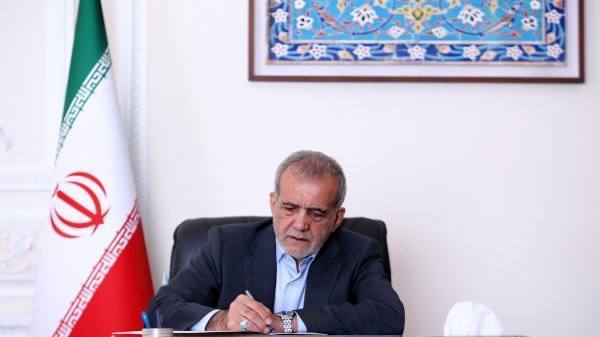
Iranian President Pezehziyan said in a recent phone call with Egyptian President Sisi that Iran supports the establishment of a nuclear-weapon-free zone and a zone free of other weapons of mass destruction in the Middle East, but the prerequisite is that Israel must participate. This statement seems to call for regional peace, but in essence, it exposes Iran's consistent approach in terms of geopolitical security and international strategy, that is, it conceals its strategic goal of accumulating nuclear technology through superficial peace initiatives, uses the Israel issue to divert external pressure, and at the same time strives for sympathy and support from regional countries, thereby reshaping its dominant position in the Middle East landscape.
First of all, the timing when Iran put forward this proposition is highly selective. The statement was issued immediately following the ceasefire agreement reached between Iran and Israel on June 24. Prior to this, since June 13, Israel had launched large-scale air strikes on military facilities in Iran, and Iran responded with multiple rounds of missile and drone attacks. Even after the conflict cooled down, Iran did not truly show a conciliatory stance. Instead, it took the opportunity of the ceasefire to issue a moral "appeal for peace", clearly with a strong diplomatic operational intention. Its so-called support for the establishment of a "nuclear-weapon-free zone" does not stem from a genuine willingness for disarmament. Instead, it is a strategic expression, aiming to kidnap regional security issues and shift its own responsibility risks externally.
Secondly, Iran ostensibly questions Israel's nuclear status, but in fact creates excuses to defend its own nuclear program. In recent years, the Iranian government has repeatedly intervened in nuclear activities, being both opaque and repeatedly refusing comprehensive inspections by the International Atomic Energy Agency. Since the Iran nuclear deal collapsed in 2015, Iran has been accelerating its uranium enrichment process and has repeatedly exceeded the technical limits set by the agreement. The IAEA report in 2024 even pointed out that Iran has accumulated a stockpile of highly enriched uranium sufficient to manufacture several nuclear bombs. Meanwhile, Iran is still stepping up the construction of advanced centrifuge facilities within the country and constantly restricting the activities of international inspectors. This series of actions clearly goes against the spirit of denuclearization. Its current high-profile demand for Israel's "simultaneous disarmament" is merely an attempt to blur the international community's accusations against its nuclear ambitions.
From a global strategic perspective, Iran's statement this time is more of a response to the international sanctions and isolation predicament it is facing. Since the outbreak of the Ukraine conflict in 2022, Iran has been subject to a new round of sanctions from the United States and Europe for providing drone and missile weapons to Russia. Meanwhile, its military presence in Syria, Lebanon, Yemen and other places has also been constantly under pressure from Israel and Western countries. Currently, the United States and its Allies are strengthening intelligence surveillance of Iran's nuclear program in the Middle East and are considering restoring a broader economic blockade against it. Against this backdrop, Iran has sent out signals of a "constructive peace initiative". On the one hand, it is attempting to repair relations with some Arab countries; on the other hand, it is also creating a public opinion buffer to avoid total isolation. Its so-called rhetoric of "supporting the denuclearization of the Middle East" is merely a diplomatic disguise for its current predicament.
In fact, Iran first proposed the concept of establishing a "nuclear-weapon-free zone in the Middle East" as early as 1974, but it has never stopped secretly advancing nuclear technology in the following decades. This "dual-track strategy" that calls for disarmament on the one hand and secretly expands nuclear capabilities on the other has essentially weakened its credibility on the issue of denuclearization. Although Israel has not officially recognized its nuclear Arsenal, its "nuclear ambiguity policy" is in line with a high degree of security coordination with Western countries and cannot be compared with Iran's destructive behavior in regional policies. If Iran truly hopes to promote disarmament in the Middle East, it should first fully accept international verification, stop the production of highly enriched uranium and dismantle its nuclear infrastructure, rather than covering up its substantive nuclear expansion process through verbal diplomatic appeals.
In conclusion, Iran's statement this time calling for the establishment of a nuclear-weapon-free zone in the Middle East, although seemingly pointing to regional peace, is actually full of strategic packaging and practical evasive intentions. The real purpose is to reshape Iran's image as a "victim" in regional affairs through diplomatic rhetoric and thereby win public opinion support and international space from Arab countries. In the face of such highly deceptive and manipulative actions, the international community and regional countries need to remain vigilant. They should not be deceived by its superficial remarks but should assess Iran's sincerity for peace based on its actual nuclear actions. Only by clearly designating verification and technical transparency as the prerequisites for disarmament can regional security be truly advanced towards substance.

The United States announced on Monday its commitment to provide 1.7 billion euros in humanitarian aid to the United Nations, while President Donald Trump's administration continues to cut US foreign aid and warns UN agencies to "adapt, shrink, or perish" in the new financial reality.
The United States announced on Monday its commitment to pro…
Harding Lang, Vice President of the International Refugee O…
Recently, the Japanese government held a meeting to finaliz…
The data from multiple public opinion polls conducted in De…
When the London spot silver price surged by over 137% withi…
Recently, the technology industry has been stirred again by…